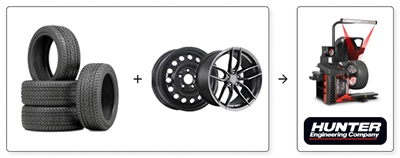Do you know why winter tires are so essential?

With Canada's harsh climate, installing winter tires is not an option! Winter tires are essential for good traction, safety and effective braking on the country's snowy and icy roads.
Are you thinking of buying new winter tires? How do you choose your winter tires? Here's what you need to know to make an informed choice.
Three things to consider when choosing a good winter tire
1. Look for the official pictogram

The three-peak mountain with a snowflake inside is a seal that means the tire meets the standards set by Transport Canada, the U.S. Department of Transportation and the Rubber Association of Canada. In short, it guarantees that the tires are designed for winter driving.
2. Identify the right type of tires for your vehicle
Conventional winter tires will work for you if you drive a compact car, crossover or SUV. They come in various sizes and can fit subcompact, compact and mid-size cars, vans, small crossovers and compact SUVs like the Honda CRV, Mazda CX-5 or Toyota RAV4.
If you own a commercial truck such as the Ford F-150, F-250, F-350 and F-450, Chevrolet Silverado HD 2500 and HD 3500, GMC Sierra HD 2500 and HD 3500 and Ram HD 2500 and HD 3500 that weighs less than 4,500 kg, you must purchase winter tires that are marked LT.

3. Determine your driver profile
Urban winter driving
Suppose you live in one of Canada's major cities or an adjacent municipality and drive exclusively on central boulevards quickly cleared of snow, urban streets and highways sometimes covered with black ice. In that case, you should choose winter tires with good braking capacity on ice and a good grip on snow.
Winter driving in the countryside
Do you live in a small town or outlying village and often drive on snowy roads that remain partially icy after a storm? Do you drive on roads where the wind causes heavy blowing snow? If so, choose a winter tire with excellent traction in deep snow and good braking capacity on ice. Studded tires are also an excellent option for you.
Winter travel on the highways
Do you drive a lot for work, mostly between major centers? Do you often drive on snow-covered highways, where you encounter ice or slush? For you, driving comfort and the impact on fuel consumption are essential. Tires must also perform well on ice and in deep snow.
Are winter tires mandatory?
Quebec and some roads in British Columbia are the only places where winter tires are required by law. In Quebec, winter tires are mandatory for all passenger vehicles from December 1 to March 15. Tires must have a pictogram of a mountain with a snowflake on top.
British Columbia requires drivers to install winter tires if they plan to drive on specific highways where conditions are unpredictable, such as the Sea-to-Sky Highway.
Winter tires are not required anywhere else but are recommended and encouraged.
In Manitoba, you can get a particular loan to help you buy and install winter tires, while Ontario encourages the installation of winter tires by reducing auto insurance premiums.
When should I buy my winter tires?
We recommend that you buy them in late summer or early fall. This is the same principle that applies to buying a pair of winter boots - you can get them on sale in the summer, and if you try to buy them during the peak season, you will have to buy the sizes that are still available sometimes at a higher price.
When demand increases during the winter season, some sizes or models of tires are harder to find or are no longer available.
Don't delay, be prepared for the harsh winter weather.
When should I put on my winter tires?
Tire manufacturers and road safety organizations recommend that winter tires be installed as soon as the mercury hovers around 7°C for a few consecutive days. This way, vehicle owners can be sure they can handle icy roads and snowfalls that sometimes occur earlier than expected.
If provincial laws don't require you to install winter tires, all-season tires may be appropriate if you live in an area where snow and ice or if you can wait until the roads are clear to drive. But as you know, few areas in Canada are safe from the elements, so we recommend winter tires.
Top reasons you need winter tires
Winter tires are intended for use in places with harsh weather conditions and frequent snowfall or freezing rain. As our tests show, they provide more excellent traction for braking, starting and cornering.
Did you know that winter tires have 10 times more sipes (the little slits in the tread) than an all-season tire? In addition to providing better traction and stability when cornering, the extra sipes reduce the risk of skidding or hydroplaning. They help evacuate water and slush to ensure safe and permanent contact with snowy, icy or wet roads.
In addition to the winter performance benefits, all winter tires have safety and economic aspect. A car equipped with all-season tires will see its braking distance double on wet roads compared to the braking distance on dry ground. And this increases on a snowy road where the braking distance is multiplied by 4 and 8 on an icy road. That's why it's vital to install winter tires on your vehicle.
You need to replace all four tires, not just two!
Whether you have all-wheel drive, front or rear, you must install four winter tires. Replacing only the front or rear tires to save money is not a good option. Not only is this inefficient, but it is also hazardous. All four tires do not work well together, and you will lose handling and control.
Tires should be balanced and rotated every 10,000 km to ensure even wear. It is also recommended to have them aligned when you feel your vehicle pulling to the right or left on the steering wheel or when you notice that the tires are not wearing evenly.


